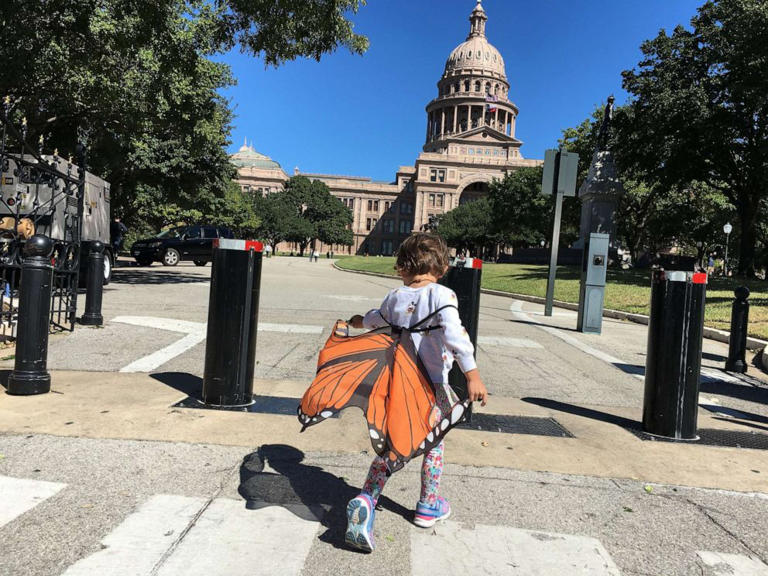ABC NEWS
Yesterday
When Texas officials announced their intentions to launch child abuse investigations involving people who provide gender-affirming care for their transgender children, Susan’s heart dropped.
Susan has a 7-year-old transgender daughter, Elsa, whose parents asked that she be referred to by a pseudonym for safety reasons, who they say may one day need such care.
Elsa's parents describe her as wise beyond her years. She had expressed that she was a girl from an early age and guided her parents through her gender journey – asking to wear dresses, change her name, and to be referred to as a “daughter” by her parents.
“When she was 3, one day, she told me, ‘I'm a girl person,’” Susan said in an interview with ABC News. It was National Daughters Day, “and she said, ‘Can I be your daughter?’ – which made me cry.”
Susan and her husband Brian, who asked that their last names not be used for safety reasons, decided the family needed to move out of Texas in light of the child abuse investigation threats. They say they weren’t sure how far the government would go to separate families like their own or affect Elsa’s access to care as she gets older.
Her family is not alone. Across the country, advocacy groups say some families are packing up and moving out of their home states that have implemented anti-LGBTQ legislation to get to a place with greater protections for the community, according to queer advocacy groups nationwide.
But Elsa didn’t want to leave, telling Susan, “‘But mommy, I can handle anything as long as we're together,’” Susan said.
Susan told her: “I feel the same way. I think we could handle anything when we're together. But the reason that we have to go is that they could make it so we can't be together anymore.”

Elsa is a trans girl, who is using a pseudonym for her safety. She and her family moved out of state due to the threat of child abuse investigations into families providing gender-affirming care to trans children.© Obtained by ABC News
As a transgender kid in a conservative region, Susan said Elsa could feel the growing tensions concerning people like her – she told her parents to “just let them hurt me,” instead of moving out of state.

“It just kind of reveals how much damage all this causes to trans people, to their families, to people that support them, to people that haven't even figured out who they are yet,” said Brian.
Elsa’s family has since moved to Washington and said LGBTQ acceptance in the community has been like day-and-night between the two states, Susan said.
Manny Santiago, the executive director of the Washington State LGBTQ Commission, said it's a bittersweet feeling to know that the state has become a safe space for families with LGBTQ members, while others implement restrictions.MORE: Fight for transgender equality transcends generations
Washington has nondiscrimination laws protecting LGBTQ people, bans on conversion therapy, trans inclusive policies for health insurance, and more.

Elsa, a trans girl, can be seen drawing on the sidewalk with her sibling.© Obtained by ABC News
“I had to leave my country because of many things – amongst them, homophobia,” said Santiago, who was born and raised in Puerto Rico.
“On the one hand, it’s great that they have a place that they can go to and find support and protections, but it's also really hard to leave home, whatever home is for you, wherever home is for you.”
Laws in place
Jamie, another parent who asked to be referred to by a pseudonym for safety reasons, moved their family from Texas to Colorado to protect her gender nonconforming teenager.
They said the move took up a lot of their savings -- a costly but important decision families say they had to make.
“That did not feel like normal teenage stress, in Texas,” said Jamie in an interview with ABC News. “Knowing that your governor and the top officials in your state literally don't want you to exist – That's a different kind of stress. It felt very genocidal there.”
Texas has officially banned gender-affirming care for transgender people under 18 and has placed restrictions on public performances that drag performers say could be used to target them.
Texas legislators said this effort is “about protecting children,” Gov. Greg Abbott told Fox News before signing the bill.
Sen. Bob Hall, a Republican who backs the bill, has said: “We protect children against lots of things. We don’t let them smoke. We don’t let them drink. We don’t let them buy lottery cards. … And so we are doing the right thing.”
But parents like Jamie and Susan – and medical researchers at several major national medical associations – assert that gender-affirming care is safe and effective. Some, like the American Medical Association, deem it "medically necessary."
Studies, including research in JAMA Surgery, have shown that gender-affirming care can be life-saving for transgender and nonbinary children and adolescents, promoting positive mental and physical health and well-being.
Abbott’s office has not yet responded to ABC News’ requests for comment concerning people fleeing the state.
Adults lose access to gender-affirming care in Florida
In Florida, new legislation bans gender-affirming care for transgender patients under 18 who are just starting their treatments.
The law also mandates that adult trans patients sign an informed consent statement, see a physician in person to receive care instead of using online medical services or seeing a health practitioner of another kind.
State funds, including social support such as Medicaid and economic assistance programs, may also not be used for gender-affirming care.
Gov. Ron DeSantis, who is now running for president, has said the legislation aims to “let kids be kids,” asserting that gender-affirming treatments are being pushed onto children.
“We never did this through all of human history until like, what, two weeks ago? Now this is something? They’re having third graders declare pronouns? We’re not doing the pronoun Olympics in Florida,” DeSantis said. Historians, however, say gender non-conforming people have existed throughout human history.
Still, some transgender adults in the state say they have been dropped from their doctors due to the new restrictions and requirements.
Sage Chelf and Nova Banks, two transgender Florida residents who say they have been left scrambling for treatments by their providers, say they feel forced to leave the state and are raising money to make their exit.

Nova Banks is a transgender woman who is trying to move out of Florida for a fresh start after new restrictions were placed on gender-affirming care in the state.
When Texas officials announced their intentions to launch child abuse investigations involving people who provide gender-affirming care for their transgender children, Susan’s heart dropped.
Susan has a 7-year-old transgender daughter, Elsa, whose parents asked that she be referred to by a pseudonym for safety reasons, who they say may one day need such care.
Elsa's parents describe her as wise beyond her years. She had expressed that she was a girl from an early age and guided her parents through her gender journey – asking to wear dresses, change her name, and to be referred to as a “daughter” by her parents.
“When she was 3, one day, she told me, ‘I'm a girl person,’” Susan said in an interview with ABC News. It was National Daughters Day, “and she said, ‘Can I be your daughter?’ – which made me cry.”
Susan and her husband Brian, who asked that their last names not be used for safety reasons, decided the family needed to move out of Texas in light of the child abuse investigation threats. They say they weren’t sure how far the government would go to separate families like their own or affect Elsa’s access to care as she gets older.
Her family is not alone. Across the country, advocacy groups say some families are packing up and moving out of their home states that have implemented anti-LGBTQ legislation to get to a place with greater protections for the community, according to queer advocacy groups nationwide.
But Elsa didn’t want to leave, telling Susan, “‘But mommy, I can handle anything as long as we're together,’” Susan said.
Susan told her: “I feel the same way. I think we could handle anything when we're together. But the reason that we have to go is that they could make it so we can't be together anymore.”

Elsa is a trans girl, who is using a pseudonym for her safety. She and her family moved out of state due to the threat of child abuse investigations into families providing gender-affirming care to trans children.© Obtained by ABC News
As a transgender kid in a conservative region, Susan said Elsa could feel the growing tensions concerning people like her – she told her parents to “just let them hurt me,” instead of moving out of state.

“It just kind of reveals how much damage all this causes to trans people, to their families, to people that support them, to people that haven't even figured out who they are yet,” said Brian.
Elsa’s family has since moved to Washington and said LGBTQ acceptance in the community has been like day-and-night between the two states, Susan said.
Manny Santiago, the executive director of the Washington State LGBTQ Commission, said it's a bittersweet feeling to know that the state has become a safe space for families with LGBTQ members, while others implement restrictions.MORE: Fight for transgender equality transcends generations
Washington has nondiscrimination laws protecting LGBTQ people, bans on conversion therapy, trans inclusive policies for health insurance, and more.

Elsa, a trans girl, can be seen drawing on the sidewalk with her sibling.© Obtained by ABC News
“I had to leave my country because of many things – amongst them, homophobia,” said Santiago, who was born and raised in Puerto Rico.
“On the one hand, it’s great that they have a place that they can go to and find support and protections, but it's also really hard to leave home, whatever home is for you, wherever home is for you.”
Laws in place
Jamie, another parent who asked to be referred to by a pseudonym for safety reasons, moved their family from Texas to Colorado to protect her gender nonconforming teenager.
They said the move took up a lot of their savings -- a costly but important decision families say they had to make.
“That did not feel like normal teenage stress, in Texas,” said Jamie in an interview with ABC News. “Knowing that your governor and the top officials in your state literally don't want you to exist – That's a different kind of stress. It felt very genocidal there.”
Texas has officially banned gender-affirming care for transgender people under 18 and has placed restrictions on public performances that drag performers say could be used to target them.
Texas legislators said this effort is “about protecting children,” Gov. Greg Abbott told Fox News before signing the bill.
Sen. Bob Hall, a Republican who backs the bill, has said: “We protect children against lots of things. We don’t let them smoke. We don’t let them drink. We don’t let them buy lottery cards. … And so we are doing the right thing.”
But parents like Jamie and Susan – and medical researchers at several major national medical associations – assert that gender-affirming care is safe and effective. Some, like the American Medical Association, deem it "medically necessary."
Studies, including research in JAMA Surgery, have shown that gender-affirming care can be life-saving for transgender and nonbinary children and adolescents, promoting positive mental and physical health and well-being.
Abbott’s office has not yet responded to ABC News’ requests for comment concerning people fleeing the state.
Adults lose access to gender-affirming care in Florida
In Florida, new legislation bans gender-affirming care for transgender patients under 18 who are just starting their treatments.
The law also mandates that adult trans patients sign an informed consent statement, see a physician in person to receive care instead of using online medical services or seeing a health practitioner of another kind.
State funds, including social support such as Medicaid and economic assistance programs, may also not be used for gender-affirming care.
Gov. Ron DeSantis, who is now running for president, has said the legislation aims to “let kids be kids,” asserting that gender-affirming treatments are being pushed onto children.
“We never did this through all of human history until like, what, two weeks ago? Now this is something? They’re having third graders declare pronouns? We’re not doing the pronoun Olympics in Florida,” DeSantis said. Historians, however, say gender non-conforming people have existed throughout human history.
Still, some transgender adults in the state say they have been dropped from their doctors due to the new restrictions and requirements.
Sage Chelf and Nova Banks, two transgender Florida residents who say they have been left scrambling for treatments by their providers, say they feel forced to leave the state and are raising money to make their exit.

Nova Banks is a transgender woman who is trying to move out of Florida for a fresh start after new restrictions were placed on gender-affirming care in the state.
© Courtesy Nova Banks
Nova Banks, a 27-year-old transgender woman, has been taking hormones for about a year and has felt more comfortable in her body than she ever has.
“Recently, people automatically say ‘she’ and ‘her’ … and just that alone was so fulfilling,” she said.
Without her hormones, she’s been stressing about what she looks like, how she’s presenting, and how people are addressing her – especially in a community she said has felt increasingly hostile toward her as a transgender woman.
“If I just start over, at least to have a community that supports people like me,” Banks said. “And at least I can go to the girls bathroom without even having to think that I'm gonna get in trouble or someone's gonna like call the police on me.”
Chelf didn’t begin transitioning until a year and a half ago. She says it took her so long to consider medically transitioning because of “how it’s shoved into our minds our entire lives that being trans is a horrible thing.”
Being able to transition has been incredibly affirming, the 30-year-old said, but without that, she said it would be “hard to deal with the hate.”MORE: Pride organizers promise safety at festivities amid anti-LGBTQ rhetoric
Chelf's timeline to move to Illinois with her long-distance girlfriend has been sped up in light of recent legislation.
“The breaking point was definitely when I called my doctor to get my routine blood test and she ended up telling me that because of new legislation, they can’t provide gender-affirming care to LGBT patients anymore,” Chelf said.
Equality Florida, which is the state’s largest LGBTQ organization, has issued a travel advisory for the state.
“People are worried about what it means to have a government telling you where to go to the bathroom and deputizing your neighbors to police who's in what stall,” said Brandon Wolf, the press secretary of Equality Florida.
“People are very worried about the attacks on health care and what that means for their children. I think people are very concerned about their family's safety.”
DeSantis’ office has not yet responded to ABC News’ requests for comment concerning people fleeing the state.

Elsa, who is using a pseudonym for her safety, poses in front of the Texas capitol building.© Obtained by Abc News
Nova Banks, a 27-year-old transgender woman, has been taking hormones for about a year and has felt more comfortable in her body than she ever has.
“Recently, people automatically say ‘she’ and ‘her’ … and just that alone was so fulfilling,” she said.
Without her hormones, she’s been stressing about what she looks like, how she’s presenting, and how people are addressing her – especially in a community she said has felt increasingly hostile toward her as a transgender woman.
“If I just start over, at least to have a community that supports people like me,” Banks said. “And at least I can go to the girls bathroom without even having to think that I'm gonna get in trouble or someone's gonna like call the police on me.”
Chelf didn’t begin transitioning until a year and a half ago. She says it took her so long to consider medically transitioning because of “how it’s shoved into our minds our entire lives that being trans is a horrible thing.”
Being able to transition has been incredibly affirming, the 30-year-old said, but without that, she said it would be “hard to deal with the hate.”MORE: Pride organizers promise safety at festivities amid anti-LGBTQ rhetoric
Chelf's timeline to move to Illinois with her long-distance girlfriend has been sped up in light of recent legislation.
“The breaking point was definitely when I called my doctor to get my routine blood test and she ended up telling me that because of new legislation, they can’t provide gender-affirming care to LGBT patients anymore,” Chelf said.
Equality Florida, which is the state’s largest LGBTQ organization, has issued a travel advisory for the state.
“People are worried about what it means to have a government telling you where to go to the bathroom and deputizing your neighbors to police who's in what stall,” said Brandon Wolf, the press secretary of Equality Florida.
“People are very worried about the attacks on health care and what that means for their children. I think people are very concerned about their family's safety.”
DeSantis’ office has not yet responded to ABC News’ requests for comment concerning people fleeing the state.

Elsa, who is using a pseudonym for her safety, poses in front of the Texas capitol building.© Obtained by Abc News
Families make moves for their children
Debi Jackson has long been an advocate for her nonbinary child, testifying against anti-LGBTQ legislation in Missouri alongside them.
Now, she hopes to give her child a fresh start in an accepting environment that offers them a chance to truly be a kid instead of an advocate for their community. The legislation has impacted their child’s mental health, according to Jackson.
“They deserve to have a life where they don't have to think their government is coming after them,” Jackson said.
“They deserve to be able to go back to thinking about their schoolwork and hanging out with your friends and playing video games,” she continued. “And they haven't had that for the last several years.”
Missouri recently banned gender-affirming care for people under 18 and barred Medicaid for paying for adult trans care.
Jackson and her family are moving out of Missouri, a plan that has been in the works for years since state legislators first began to express concerns or speculation concerning gender-affirming care.
“Because we don't know what's going to happen and because we don't trust them, it's time to go,” Jackson said. “I don't want my child to have to live through another one of the years of ‘what ifs.’”


No comments:
Post a Comment